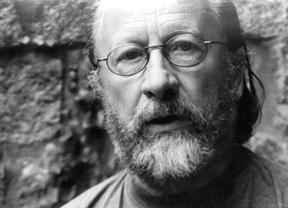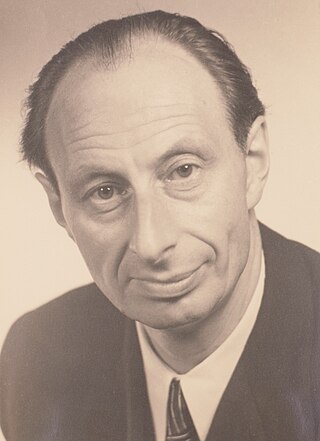Related Research Articles

Georg Katzer was a German composer and teacher. The last master student of Hanns Eisler, he composed music in many genres, including works for the stage. Katzer was one of the pioneers of electronic new music in the German Democratic Republic and the founder of the first electronic-music studio in the GDR. He held leading positions in music organisations, first in the East, then in the united Germany, and received many awards, including the Art Prize of the German Democratic Republic, the National Prize of the German Democratic Republic, the Order of Merit of the Federal Republic of Germany, and the German Music Authors' Prize.

Günter Kochan was a German composer. He studied with Boris Blacher and was a master student for composition with Hanns Eisler. From 1967 until his retirement in 1991, he worked as professor for musical composition at the Hochschule für Musik "Hanns Eisler". He taught master classes in composition at the Academy of Music and the Academy of Arts, Berlin. He was also secretary of the Music Section of the Academy of Arts from 1972 to 1974 and vice-president of the Association of Composers and Musicologists of the GDR from 1977 to 1982. Kochan is one of eleven laureates to have been awarded the National Prize of the GDR four times. In addition, he received composition prizes in the US and Eastern Europe. He became internationally known in particular for his Symphonies as well as the cantata Die Asche von Birkenau (1965) and his Music for Orchestra No. 2 (1987). His versatile oeuvre included orchestral works, chamber music, choral works, mass songs and film music and is situated between socialist realism and avant-garde.
Gruppe Neue Musik Hanns Eisler was an ensemble of musicians founded in 1970 in Leipzig with a focus on contemporary classical music, which played several world premieres and toured internationally. The ensemble disbanded in 1993.

Ingeburg "Inge" Lange was an East German politician.
Bruno Kaiser was a Marxist scholar of German studies who became a journalist and, during the Nazi period, a resistance activist. In his later years he became, in addition, a distinguished librarian.
Herta Geffke was a German activist and politician who resisted Nazism. After 1945 she became a member of the Party Central Control Commission in the Soviet occupation zone, identified as a "true Stalinist" and feared on account of her interrogation methods.

Sonja Kehler was a German actress and chanson singer, known internationally for her interpretation of works by Bertolt Brecht, first playing his characters on the theatre stage, then focused on singing his songs and those of others in solo programs. She also taught acting in Danish at the theatre academy in Odense, appeared in films, worked as stage director and presented literary programs.
Paul Markowski was an East German politician. He became a member of the country's powerful Party Central Committee in 1971, at the unusually young age of 43. He was also unusually talented as a linguist. A promising career was cut short, however, when he died as the result of a desert helicopter accident while accompanying Werner Lamberz on a trade mission to Libya.

Roswitha Trexler is a German operatic soprano and mezzo-soprano who became internationally known especially as an interpreter of the music of Hans Eisler and for her commitment to avantgarde vocal music.

Frank Schneider is a German musicologist.
Harry Nick was an East German Marxist economist.
Wolfgang Lesser was a German composer and music official of the DDR.
The Hanns Eisler Prize was an East-German music award, named after the composer Hanns Eisler. It was awarded by Radio DDR – with advisory participation of the music section of the Akademie der Künste der DDR in Berlin (East) and the Verband der Komponisten und Musikwissenschaftler der DDR (VDK) – and on the occasion of his 70th birthday on 6 July 1968, the first time in the ballroom of the Alten Rathaus. The Hanns Eisler Prize was endowed with 10,000 marks and was one of the most renowned music prizes in the German Democratic Republic.
Jürgen Elsner is a German music ethnologist and author.
Nathan "Noto" Notowicz was a German musicologist and composer.
Kathinka Rebling was a German violinist and musicologist.

Helmut Koch was a German conductor, choir leader, composer, and academic teacher. He was recording manager for the Berliner Rundfunk from 1945, where he founded the Solistenvereinigung Berlin, the Kammerorchester Berlin and the Großer Chor des Berliner Rundfunks. He conducted a recording of Monteverdi's L'Orfeo in 1949, and later also contemporary music by composers including Hanns Eisler, Fritz Geißler, Ernst Hermann Meyer and Ruth Zechlin. He was professor at the Hochschule für Musik "Hanns Eisler" from its beginning. After working as a regular guest conductor at the Staatsoper Berlin, he became Generalmusikdirektor. He was the first conductor of the Berliner Singakademie in East Berlin, and held the position until his death.
Gustav Schmahl was a German violinist and university lecturer. He was the only student of David Oistrach from the GDR. Schmahl worked at times as concertmaster of the Rundfunk-Sinfonieorchester Berlin and from 1973 to 1984 as rector of the University of Music and Theatre Leipzig.

Günter Rimkus was a German dramaturge and, from 1984 to 1991, manager of the Staatsoper Unter den Linden.
Heinz Gronau was a communist resistance activist during the Hitler years. He was transferred to Buchenwald concentration camp in 1938. At the concentration camp he became a leading figure in the "International Buchenwald Military Organisation" . He survived the war and in 1946 joined the (semi-militarised) police service in the Soviet occupation zone of Germany. A succession of promotions followed. In 1966 he was promoted to the rank of Major general in the East German Felix Dzerzhinsky Guards Regiment. During the final years of his career he combined his overtly military posting with command of the National Department I at the Ministry for State Security ("Stasi"). The department was a specialist intelligence section of the ministry, tasked with attending to the intelligence needs of the ministry's armed units.
References
- ↑ Liesel Markowski. ""Dmitri Schostakowitsch – Ich habe keine einzige Note geschrieben, die falsch ist ." Gedanken zu zwei neuen Publikationen" (PDF). pp. 37–43. Retrieved 20 October 2017.
- 1 2 3 4 Jochen Voit (26 May 2010). "Liesel Markowski [in Gespraech] über die Aufbruchstimmung in der jungen DDR und die Gemeinschaft stiftende Rolle der Musik von Hanns Eisler und Ernst Busch". erinnerungsort.de. Retrieved 20 October 2017.
- ↑ Liesel Markowski (4 December 2009). "Konzerthaus Berlin: Schön, tief". Neues Deutschland, Sozializtische Tageszeitung. Neues Deutschland Druckerei und Verlag GmbH. Retrieved 21 October 2017.
- ↑ Lothar Mertens (2004). Anhang 3: Dissertationen A und Dissertationen B bei der Akademie für Gesellschaftswissenschaften beim ZK der SED. Rote Denkfabrik?: die Akademie für Gesellschaftswissenschaften beim ZK der SED. LIT Verlag Münster. p. 390. ISBN 978-3-8258-8034-7.
- ↑ Berliner Zeitung, 4 October 1978, p. 5
- ↑ Berliner Zeitung, 6 October 1988, p. 4